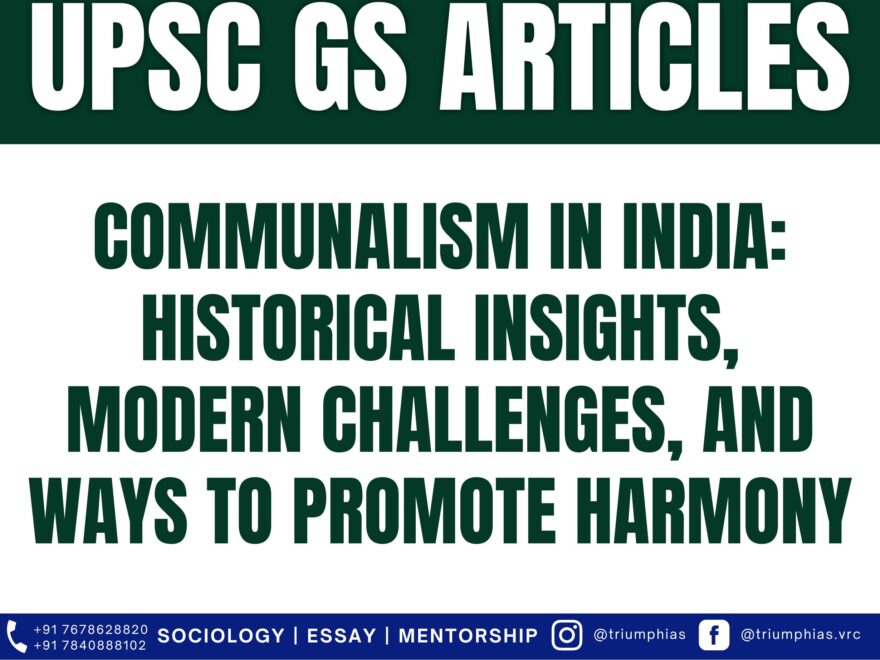Communalism
(Relevant for General Studies Paper Prelims/Mains)
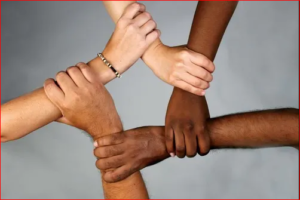
Communalism, broadly defined, refers to a strong allegiance to one’s own community. In the context of India, it is often interpreted as an unhealthy attachment to one’s religion.
As an ideology, communalism seeks to unite a community by downplaying internal differences and highlighting the collective unity of the community in contrast to others. Consequently, it fosters belief in conservative principles, intolerance, and animosity towards other religions, thus leading to societal division.
The positive aspect of communalism involves individuals showing affinity towards their own community and working towards its social and economic progress. However, in a negative sense, it becomes an ideology that accentuates the distinct identity of a religious group compared to others, often promoting its own interests at the expense of others.
- Communalism, as a political ideology, finds its origins in India’s religious and cultural diversity. Unfortunately, it has been misused as a political propaganda tool to sow division, differences, and tensions between communities based on religious and ethnic identities, leading to communal animosity and violence.
- In ancient Indian society, people of diverse faiths coexisted harmoniously. Buddha, one of India’s early spiritual leaders, propagated the concept of secularism. Similarly, Kings like Ashoka embraced policies of peace and religious tolerance.
- During medieval India, the arrival of Islam brought occasional instances of violence, such as Mahmud Ghazni’s destruction of Hindu temples and Mahmud of Ghor’s attacks on Hindus, Jains, and Buddhists. While religion held significance in people’s lives, there was no prevalence of communal ideology or politics.
- Rulers like Akbar and Sher Shah Suri adopted a policy of religious toleration, promoting various cultures and traditions across the country. However, some sectarian rulers, like Aurangzeb, displayed a lack of tolerance towards other religious practices.
- As a modern phenomenon, communalism emerged in response to British colonial influence and the reaction of different social groups within India.
The significant factors contributing to the rise and growth of communalism in modern India are as follows:
- British Imperialism and their “Divide and Rule” Policy: The British colonial rulers strategically exploited religious divisions to maintain control over India, fostering animosity between communities for their own benefit.
- Disappointment and Frustration Among the Middle Class: The stagnation in agriculture, lack of modern industrial development, and limited employment opportunities led to disillusionment among the aspiring middle-class youth. This discontent was exploited by political opportunists for their own gains.
- Hindu and Muslim Revivalist Movements: Revivalist movements within the Hindu and Muslim communities sought to assert and preserve their respective identities, inadvertently deepening communal divides.
- Communal and Distorted History Teaching: The portrayal of Indian history in a communal and biased manner in educational institutions played a significant role in fueling communal sentiments among the masses.
- Muslim Separatism and Isolation: Certain segments within the Muslim community felt marginalized and isolated, leading to a sense of separatism that exacerbated communal tensions.
- Rise of Communal and Fundamentalist Parties: The emergence of political parties with communal and fundamentalist ideologies further polarized the society along religious lines.
- Communalism is frequently defined as a political ideology that exploits religious and cultural differences to achieve political advantages.
- Economic disparities, class divisions, poverty, and unemployment contribute to the insecurity experienced by the general population, making them susceptible to political manipulation.
- The likelihood of recurring communal riots is higher in a town where such riots have already taken place once or twice compared to a town where such incidents have never occurred.
- The lack of access to scientific and technological education, resulting in inadequate representation in public service, industry, and trade, has led to a sense of relative deprivation among Muslims.
- The resurgence of economic competition between Hindus and Muslims, particularly among the lower and middle-class segments, has fueled the growth of communal ideologies.
- A lack of interpersonal trust and mutual understanding between the two communities often leads to perceptions of threat, harassment, fear, and danger from one community towards the members of the other community, resulting in conflicts, hatred, and anger.
Measures to Deal with Communalism
- There is a need for reforms in the current criminal justice system, ensuring speedy trials and providing adequate compensation to victims, which may act as a deterrent.
- Increasing representation of minority communities and weaker sections in all law-enforcement wings, along with human rights training for forces, especially regarding the use of firearms in accordance with UN code of conduct, is crucial.
- Having codified guidelines for administration, specialized training for the police force to handle communal riots, and establishing special investigating and prosecuting agencies can help in mitigating major communal tensions.
- Emphasizing value-oriented education with a focus on peace, non-violence, compassion, secularism, and humanism, as well as promoting the development of scientific temper and rationalism as core values in children at schools and universities, can prove vital in preventing communal feelings.
- The government can consider adopting models followed by countries like Malaysia, which have developed early-warning indicators to prevent racial clashes. The Malaysian Ethnic Relations Monitoring System (Mesra) uses a quality of life index, including criteria such as housing, health, income, and education, and a perception index to gauge people’s needs and feelings about race relations in their area.
- Additionally, emulating the Hong Kong model of combating communalism by setting up a “Race Relation Unit” to promote racial harmony and facilitate the integration of ethnic minorities can be beneficial for India. The Race Relation Unit has established a hotline for complaints and inquiries on racial discrimination, and it conducts educational programs in schools to raise awareness about communal harmony and the concept of racial discrimination.
To master these intricacies and fare well in the Sociology Optional Syllabus, aspiring sociologists might benefit from guidance by the Best Sociology Optional Teacher and participation in the Best Sociology Optional Coaching. These avenues provide comprehensive assistance, ensuring a solid understanding of sociology’s diverse methodologies and techniques.
communalism, India, religious tolerance, Bri20tish colonialism, Divide and Rule, Hindu-Muslim relations, communal violence, societal division, economic disparities, revivalist movements, communal riots, peace initiatives, secularism, non-violence, Race Relation Unit, communal harmony, Best Sociology Optional Coaching, Sociology Optional Syllabus,

Sociology Optional Syllabus
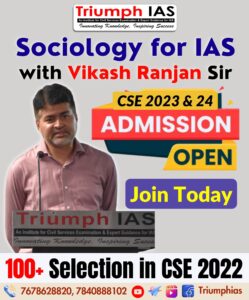
Course Commencement Information
- Enrolment is limited to a maximum of 250 Seats.
- Course Timings: Evening Batch
- Course Duration: 4.5 Months
- Class Schedule: Monday to Saturday
- Batch Starts from: Admission Open Online Batch
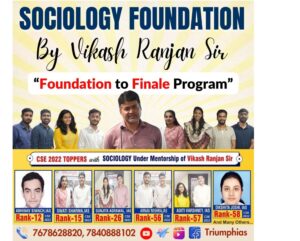
Instructional Format:
- Each class session is scheduled for a duration of two hours.
- At the conclusion of each lecture, an assignment will be distributed by Vikash Ranjan Sir for Paper-I & Paper-II coverage.
Study Material:
- A set of printed booklets will be provided for each topic. These materials are succinct, thoroughly updated, and tailored for examination preparation.
- A compilation of previous years’ question papers (spanning the last 27 years) will be supplied for answer writing practice.
- Access to PDF versions of toppers’ answer booklets will be available on our website.
- Post-course, you will receive two practice workbooks containing a total of 10 sets of mock test papers based on the UPSC format for self-assessment.
Additional Provisions:
- In the event of missed classes, video lectures will be temporarily available on the online portal for reference.
- Daily one-on-one doubt resolution sessions with Vikash Ranjan Sir will be organized post-class.
Syllabus of Sociology Optional
Paper-1
FUNDAMENTALS OF SOCIOLOGY
- Sociology – The Discipline
- Sociology as Science:
- Research Methods and Analysis:
- Sociological Thinkers:
- Karl Marx- Historical materialism, mode of production, alienation, class struggle.
- Emile Durkheim- Division of labour, social fact, suicide, religion and society.
- Max Weber- Social action, ideal types, authority, bureaucracy, protestant ethic and the spirit of capitalism.
- Talcott Parsons- Social system, pattern variables.
- Robert K. Merton- Latent and manifest functions, conformity and deviance, reference groups.
- Mead – Self and identity.
- Stratification and Mobility:
- Concepts- equality, inequality, hierarchy, exclusion, poverty and deprivation.
- Theories of social stratification- Structural functionalist theory, Marxist theory, Weberian theory.
- Dimensions – Social stratification of class, status groups, gender, ethnicity and race.
- Social mobility- open and closed systems, types of mobility, sources and causes of mobility.
- Works and Economic Life:
- Social organization of work in different types of society- slave society, feudal society, industrial /capitalist society
- Formal and informal organization of work.
- Labour and society.
- Politics and Society:
- Sociological theories of power.
- Power elite, bureaucracy, pressure groups, and political parties.
- Nation, state, citizenship, democracy, civil society, ideology.
- Protest, agitation, social movements, collective action, revolution.
- Religion and Society:
- Sociological theories of religion.
- Types of religious practices: animism, monism, pluralism, sects, cults.
- Religion in modern society: religion and science, secularization, religious revivalism, fundamentalism.
- Systems of Kinship:
- Family, household, marriage.
- Types and forms of family.
- Lineage and descent.
- Patriarchy and sexual division of labour.
- Contemporary trends.
- Social Change in Modern Society:
- Sociological theories of social change.
- Development and dependency.
- Agents of social change.
- Education and social change.
- Science, technology and social change.
Paper-2
INDIAN SOCIETY: STRUCTURE AND CHANGE
INTRODUCING INDIAN SOCIETY
- Perspectives on the study of Indian society:
- Indology (GS. Ghurye).
- Structural functionalism (M N Srinivas).
- Marxist sociology (A R Desai).
- Impact of colonial rule on Indian society :
- Social background of Indian nationalism.
- Modernization of Indian tradition.
- Protests and movements during the colonial period.
- Social reforms.
SOCIAL STRUCTURE
- Perspectives on the study of Indian society:
- The idea of Indian village and village studies.
- Agrarian social structure – evolution of land tenure system, land reforms.
- Caste System:
- Perspectives on the study of caste systems: GS Ghurye, M N Srinivas, Louis Dumont, Andre Beteille.
- Features of caste system.
- Untouchability – forms and perspectives.
- Tribal communities in India
- Definitional problems.
- Geographical spread.
- Colonial policies and tribes.
- Issues of integration and autonomy.
- Social Classes in India:
-
- Agrarian class structure.
-
-
- Industrial class structure.
- Middle classes in India.
-
- Systems of Kinship in India:
- Lineage and descent in India.
- Types of kinship systems.
- Family and marriage in India.
- Household dimensions of the family.
- Patriarchy, entitlements and sexual division of labour
- Religion and Society:
- Religious communities in India.
- Problems of religious minorities.
- Patriarchy, entitlements and sexual division of labour
SOCIAL CHANGES IN INDIA
- Visions of Social Change in India:
- Idea of development planning and mixed economy
- Constitution, law and social change.
- Education and social change.
- Rural and Agrarian transformation in India:
- Programmes of rural development, Community Development Programme, cooperatives,poverty alleviation schemes
- Green revolution and social change.
- Changing modes of production in Indian agriculture.
- Problems of rural labour, bondage, migration.
3. Industrialization and Urbanisation in India:
-
- Evolution of modern industry in India.
- Growth of urban settlements in India.
- Working class: structure, growth, class mobilization.
- Informal sector, child labour
- Slums and deprivation in urban areas.
4. Politics and Society:
-
- Nation, democracy and citizenship.
- Political parties, pressure groups , social and political elite
- Regionalism and decentralization of power.
- Secularization
5. Social Movements in Modern India:
-
- Peasants and farmers movements.
- Women’s movement.
- Backward classes & Dalit movement.
- Environmental movements.
- Ethnicity and Identity movements.
6. Population Dynamics:
-
- Population size, growth, composition and distribution
- Components of population growth: birth, death, migration.
- Population policy and family planning.
- Emerging issues: ageing, sex ratios, child and infant mortality, reproductive health.
7. Challenges of Social Transformation:
-
- Crisis of development: displacement, environmental problems and sustainability
- Poverty, deprivation and inequalities.
- Violence against women.
- Caste conflicts.
- Ethnic conflicts, communalism, religious revivalism.
- Illiteracy and disparities in education.
About Vikash Ranjan Sir
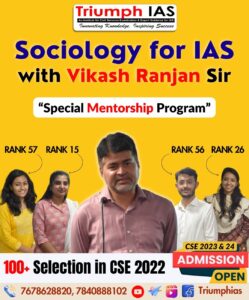
Vikash Ranjan Sir
(Best Sociology Optional Teacher, Educator, Mentor & Author)
Mr. Vikash Ranjan, arguably the Best Sociology Optional Teacher, has emerged as a versatile genius in teaching and writing books on Sociology & General Studies. His approach to the Sociology Optional Syllabus / Sociology Syllabus is remarkable, and his Sociological Themes and Perspectives are excellent. His teaching aptitude is Simple, Easy and Exam Focused. He is often chosen as the Best Sociology Teacher for Sociology Optional UPSC aspirants.
About Triumph IAS
Innovating Knowledge, Inspiring Success We, at Triumph IAS, pride ourselves on being the best sociology optional coaching platform. We believe that each Individual Aspirant is unique and requires Individual Guidance and Care, hence the need for the Best Sociology Teacher. We prepare students keeping in mind his or her strength and weakness, paying particular attention to the Sociology Optional Syllabus / Sociology Syllabus, which forms a significant part of our Sociology Foundation Course.
Course Features
Every day, the Best Sociology Optional Teacher spends 2 hours with the students, covering each aspect of the Sociology Optional Syllabus / Sociology Syllabus and the Sociology Course. Students are given assignments related to the Topic based on Previous Year Question to ensure they’re ready for the Sociology Optional UPSC examination.
Regular one-on-one interaction & individual counseling for stress management and refinement of strategy for Exam by Vikash Ranjan Sir, the Best Sociology Teacher, is part of the package. We specialize in sociology optional coaching and are hence fully equipped to guide you to your dream space in the civil service final list.
Specialist Guidance of Vikash Ranjan Sir
 Vikash Ranjan Sir is a specialist and arguably the Best Sociology Optional Teacher. His scientific, systematic, applied & exam-focused approach has helped many students to get selected in the Civil Services.
Vikash Ranjan Sir is a specialist and arguably the Best Sociology Optional Teacher. His scientific, systematic, applied & exam-focused approach has helped many students to get selected in the Civil Services.
The Best Sociology Teacher helps students to get a complete conceptual understanding of each and every topic of the Sociology Optional Syllabus / Sociology Syllabus, enabling them to attempt any of the questions, be direct or applied, ensuring 300+ Marks in Sociology Optional.
Classrooms Interaction & Participatory Discussion
The Best Sociology Teacher, Vikash Sir, ensures that there’s explanation & DISCUSSION on every topic of the Sociology Optional Syllabus / Sociology Syllabus in the class. The emphasis is not just on teaching but also on understanding, which is why we are known as the Best Sociology Optional Coaching institution.
Preparatory-Study Support
 The Sociology Foundation Course is designed to provide students with a strong base for the Sociology Optional. Study support from Triumph IAS & personal mentorship of the Best Sociology Teacher, Vikash Sir, is provided till final selection. Vikash Sir provides special guidance session for “Essay & Mains General Study” too, making our Sociology Course a well-rounded one.
The Sociology Foundation Course is designed to provide students with a strong base for the Sociology Optional. Study support from Triumph IAS & personal mentorship of the Best Sociology Teacher, Vikash Sir, is provided till final selection. Vikash Sir provides special guidance session for “Essay & Mains General Study” too, making our Sociology Course a well-rounded one.
Online Support System (Oss)
Get access to an online forum for value addition study material, journals, and articles relevant to Sociology on www.triumphias.com. Ask preparation related queries directly to the Best Sociology Teacher, Vikash Sir, via mail or WhatsApp.
Strategic Classroom Preparation
 Our Sociology Course is characterized by interactive and applied teaching with an “Exam Focussed” approach, which inculcates a Sociological sense and competency in the students. The Sociology Foundation Course, lasting four months, includes theoretical discussion, concept building, and answer writing with a focus on learning & application.
Our Sociology Course is characterized by interactive and applied teaching with an “Exam Focussed” approach, which inculcates a Sociological sense and competency in the students. The Sociology Foundation Course, lasting four months, includes theoretical discussion, concept building, and answer writing with a focus on learning & application.
Comprehensive Study Material
We provide printed booklets of concise, well-researched, exam-ready study material for every unit of the Sociology Optional Syllabus / Sociology Syllabus, making us the Best Sociology Optional Coaching platform.
Why Vikash Ranjan’s Classes for Sociology?
Proper guidance and assistance are required to learn the skill of interlinking current happenings with the conventional topics. VIKASH RANJAN SIR at TRIUMPH IAS guides students according to the Recent Trends of UPSC, making him the Best Sociology Teacher for Sociology Optional UPSC.
At Triumph IAS, the Best Sociology Optional Coaching platform, we not only provide the best study material and applied classes for Sociology for IAS but also conduct regular assignments and class tests to assess candidates’ writing skills and understanding of the subject.
Choose The Best Sociology Optional Teacher for IAS Preparation?
At the beginning of the journey for Civil Services Examination preparation, many students face a pivotal decision – selecting their optional subject. Questions such as “which optional subject is the best?” and “which optional subject is the most scoring?” frequently come to mind. Choosing the right optional subject, like choosing the best sociology optional teacher, is a subjective yet vital step that requires a thoughtful decision based on facts. A misstep in this crucial decision can indeed prove disastrous.
Ever since the exam pattern was revamped in 2013, the UPSC has eliminated the need for a second optional subject. Now, candidates have to choose only one optional subject for the UPSC Mains, which has two papers of 250 marks each. One of the compelling choices for many has been the sociology optional. However, it’s strongly advised to decide on your optional subject for mains well ahead of time to get sufficient time to complete the syllabus. After all, most students score similarly in General Studies Papers; it’s the score in the optional subject & essay that contributes significantly to the final selection.
“A sound strategy does not rely solely on the popular
Opinion of toppers or famous YouTubers cum teachers.”
It requires understanding one’s ability, interest, and the relevance of the subject, not just for the exam but also for life in general. Hence, when selecting the best sociology teacher, one must consider the usefulness of sociology optional coaching in General Studies, Essay, and Personality Test.
The choice of the optional subject should be based on objective criteria, such as the nature, scope, and size of the syllabus, uniformity and stability in the question pattern, relevance of the syllabic content in daily life in society, and the availability of study material and guidance. For example, choosing the best sociology optional coaching can ensure access to top-quality study materials and experienced teachers. Always remember, the approach of the UPSC optional subject differs from your academic studies of subjects. Therefore, before settling for sociology optional, you need to analyze the syllabus, previous years’ pattern, subject requirements (be it ideal, visionary, numerical, conceptual theoretical), and your comfort level with the subject.
This decision marks a critical point in your UPSC – CSE journey, potentially determining your success in a career in IAS/Civil Services. Therefore, it’s crucial to choose wisely, whether it’s the optional subject or the best sociology optional teacher. Always base your decision on accurate facts, and never let your emotional biases guide your choices. After all, the search for the best sociology optional coaching is about finding the perfect fit for your unique academic needs and aspirations.
To master these intricacies and fare well in the Sociology Optional Syllabus, aspiring sociologists might benefit from guidance by the Best Sociology Optional Teacher and participation in the Best Sociology Optional Coaching. These avenues provide comprehensive assistance, ensuring a solid understanding of sociology’s diverse methodologies and techniques. Sociology, Social theory, Best Sociology Optional Teacher, Best Sociology Optional Coaching, Sociology Optional Syllabus.
Best Sociology Optional Teacher, Sociology Syllabus, Sociology Optional, Sociology Optional Coaching, Best Sociology Optional Coaching, Best Sociology Teacher, Sociology Course, Sociology Teacher, Sociology Foundation, Sociology Foundation Course, Sociology Optional UPSC, Sociology for IAS,
Follow us :
🔎 https://www.instagram.com/triumphias
🔎https://www.youtube.com/c/TriumphIAS
https://t.me/VikashRanjanSociology
Find More Blogs
|
Scope of the subject and comparison with other social sciences |
|||
|
|
|
|
Modernity and social changes in Europe |

